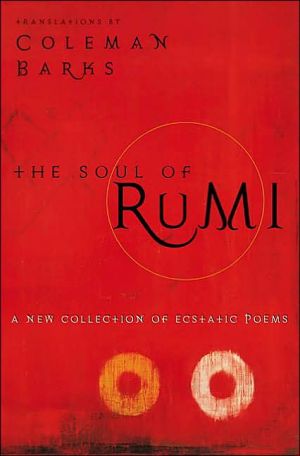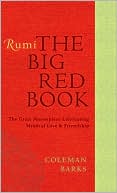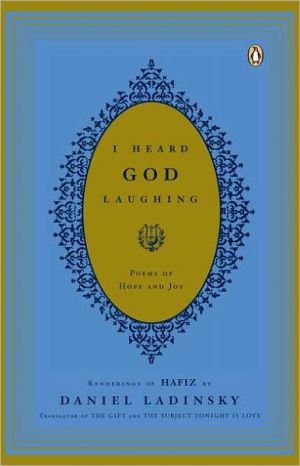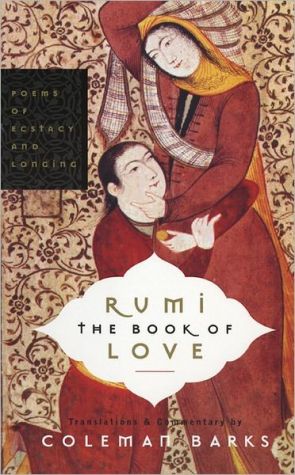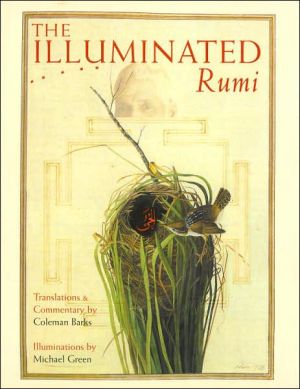The Soul of Rumi: A New Collection of Ecstatic Poems
The Soul of Rumi is renowned poet Coleman Barks' first major assemblage of newly translated Rumi poems since his bestselling The Essential Rumi.\ Coleman Barks presents entirely new translations of Rumi's poems, published for the first time in The Soul of Rumi. The poems range over the breadth of Rumi's themes: silence, emptiness, play, God, peace, grief, sexuality, music, to name just a few. But the focus is on the ecstatic experience of human and divine love and their inseparability,...
Search in google:
The Soul of Rumi presents entirely new translations of Rumi's poems—published for the first time—by Coleman Barks, the man most responsible for making Rumi the bestselling poet in America. Focusing on the ecstatic experience of human and divine love and their inseparability, the poems range over the breadth of Rumi's themes: silence, emptiness, play, God, peace, grief, sexuality, music, and more.This one-of-a-kind volume captures Rumi's beloved passion, daring, and insights into the longing of the heart as only Barks can do.Jack KornfieldThe gold of Rumi pours down through Coleman's words. The words leap off the page and dance!
Chapter One\ \ \ A Green Shawl: Solomon's Far Mosque\ \ \ In the early 1990s — it was December — I was sitting in meditation under the green dome that houses Rumi's tomb in Konya. Someone came up and gave me a green shawl. As you might imagine, I treasure it still and use it in my meditation. I love the wrapped, rapt feeling.\ Going in, feeling the limpid contentment in being oneself and the endless discovery there: the green shawl is that, reminiscent of a child's tent-making delight, the rainy-day times when you spread a sheet over a card table and a chair, anchored it with safety pins, and crept under the shelter where imagination could flower. How we forget this tent making for such long spans is a mystery in itself.\ Rumi tells of Solomon's practice of building each dawn a place made of intention and compassion and sohbet (mystical conversation). He calls it the "far mosque." Solomon goes there to listen to the plants, the new ones that come up each morning. They tell him of their medicinal qualities, their potential for health, and also the dangers of poisoning.\ I suggest we all get green shawls. "Remember, the entrance door to the sanctuary is inside you" ("Entrance Door"). Mary's hiding place and the great warehouse ("What Was Told, That") are other images of the listening tent, where conversation thrives and love deepens.\ Rumi often hears it as the birdlike song-talk that begins at dawn under the dome of meditation. Build a far mosque where you can read your soul-bookand listen to the dreams that grew in the night. Attar says,\ Let love lead your soul.\ Make it a place to retire to,\ a kind of cave, a retreat\ for the deep core of being.\ \ \ Entrance Door\ \ \ How lover and beloved touch is\ familiar and courteous, but there\ is a strange impulse in that to\ create a form that will dissolve\ \ all other shapes. Remember, the\ entrance door to the sanctuary is\ inside you. We watch a sunlight\ dust dance, and we try to be that\ lively, but nobody knows what music\ those particles hear. Each of us\ has a secret companion musician to\ dance to. Unique rhythmic play, a\ motion in the street we alone know\ and hear. Shams is a king of kings\ like Mahmud, but there's not another\ pearl-crushing dervish Ayaz like me.\ \ \ \ What Was Told, That\ \ \ What was said to the rose that made it open was said\ to me here in my chest.\ \ What was told the cypress that made it strong\ and straight, what was\ whispered the jasmine so it is what it is, whatever made\ sugarcane sweet, whatever\ was said to the inhabitants of the town of Chigil in\ Turkestan that makes them\ so handsome, whatever lets the pomegranate flower blush\ like a human face, that is\ being said to me now. I blush. Whatever put eloquence in\ language, that's happening here.\ The great warehouse doors open; I fill with gratitude,\ chewing a piece of sugarcane,\ in love with the one to whom every that belongs!\ \ \ \ Mary's Hiding\ \ \ Before these possessions you love slip away, say what\ Mary said when she was\ \ surprised by Gabriel, I'll hide inside God. Naked in\ her room she saw a form\ of beauty that could give her new life. Like the sun\ coming up, or a rose as it\ opens. She leaped, as her habit was, out of herself\ into the divine presence.\ There was fire in the channel of her breath. Light and\ majesty came, I am smoke\ from that fire and proof of its existence, more than\ any external form.\ \ \ \ I want to be where\ your bare foot walks,\ \ because maybe before you step,\ you'll look at the ground. I want that blessing.\ \ \ \ Would you like to have revealed to you\ the truth of the Friend?\ \ Leave the rind,\ and descend into the pith.\ Fold within fold, the beloved\ drowns in its own being. This world\ is drenched with that drowning.\ Imagining is like feeling around\ in a dark lane, or washing\ your eyes with blood.\ You are the truth\ from foot to brow. Now,\ what else would you like to know?\ \ \ \ The Husk and Core of Masculinity\ \ \ Masculinity has a core of clarity, which does not act\ from anger or greed or\ \ sensuality, and a husk, which does. The virile center\ that listens within takes\ pleasure in obeying that truth. Nobility of spirit,\ the true spontaneous energy\ of your life, comes as you abandon other motives and move\ only when you feel the majesty\ that commands and is the delight of the self. Remember\ Ayaz crushing the king's pearl!\ \ \ \ The Soul of Rumi. Copyright © by Coleman Barks. Reprinted by permission of HarperCollins Publishers, Inc. All rights reserved. Available now wherever books are sold.
\ From Barnes & Noble"Leave the rind / and descend into the pith / Fold within fold, the beloved / drowns in its own being." The poetry of Jalil Al-Din Rumi (1207-1273) brims with self-extinguishing refinements, each of which draws you in with its alluring elusiveness. Tactile, mystical, and ruminative by turns, the verse of this 13th-century Sufi has evoked disparate readings over the centuries. This rendering, by poet Coleman Barks, has won praise from both fellow poets and Rumi specialists.\ \ \ \ \ Jerry Stahl"Rumi will transform you, in ways you didn’t know you needed transforming."\ \ \ Yoga Journal"Coleman Barks’s Rumi translations [make] Rumi’s raptures accessible in language at once ordinary and lyrical."\ \ \ \ \ Booklist"The best of Rumi’s beautiful and challenging imagery."\ \ \ \ \ Jack Kornfield"The gold of Rumi pours down through Coleman’s words. The words leap off the page and dance!"\ \ \ \ \ Yoga Journal“Coleman Barks’s Rumi translations [make] Rumi’s raptures accessible in language at once ordinary and lyrical.”\ \ \ \ \ Booklist“The best of Rumi’s beautiful and challenging imagery.”\ \ \ \ \ Jack KornfieldThe gold of Rumi pours down through Coleman's words. The words leap off the page and dance!\ \ \ \ \ Publishers WeeklyThe Islamic mystical poet Rumi (1207- 1273) improvised the evocative poems which his followers wrote down. Translator Coleman Barks's The Essential Rumi won the Persian writer American fans, some of whom revere the poet as a religious guide. Now Barks is back with The Soul of Rumi: A New Collection of Ecstatic Poems. The giant volume includes part of Rumi's 64,000-line Masnavi, as well as many short poems and Barks's copious, informal, personal commentary. (Oct.) Copyright 2001 Cahners Business Information.\ \
